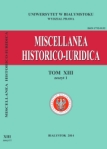Działalność gabinetu Leopolda Skulskiego w świetle protokołów posiedzeń Rady Ministrów (13 XII 1919 – 9 VI 1920) i rola rządu w okresie przygotowań do „wyprawy kijowskiej”
Activities of the cabinet of Leopold Skulski on the basis of the minutes of the Council of Ministers’ Meetings (13th December 1919 – 9th June 1920) and the role of the government in the period of preparations for the Kiev offensive
Author(s): Jacek GoclonSubject(s): Law, Constitution, Jurisprudence, Agriculture, History of Law, Government/Political systems, Pre-WW I & WW I (1900 -1919), Interwar Period (1920 - 1939)
Published by: Wydawnictwo Uniwersytetu w Białymstoku
Keywords: Józef Piłsudski; Kiev campaign; agricultural policy; unification of local currency; standard price tariff for railway connections;
Summary/Abstract: The government of Leopold Skulski had been active under the pressure of war preparation but was mainly occupied by internal issues. Foreign policy was under the control of the country’s leader, Marshal J. Piłsudski. The cabinet of Leopold Skulski had little room for maneuver, the expenses connected with the war campaign represented 60% of the country’s total budget. Even though war orders had a very positive influence on industrial and agricultural output growth, the bulk of that output had been absorbed by the army, which automatically created problems in the open market. Similarly, the country’s foreign trade balance was significantly overloaded by the burden of military expenditure with inflation providing a source of solid revenue income for covering war expenses. The Skulski government tried to stabilize the internal balance; on 1 April 1920 it unified the various state treasury and taxation systems and on 29 April, it unified the country’s five currencies into a single currency. On 1 June, a unified railway tariff covering the whole country was introduced. During the activity of this government, parliament had to agree an eight hour working day and a 46 hour working week for the workers, as well as providing them with a social security system.
Journal: Miscellanea Historico-Iuridica
- Issue Year: 13/2014
- Issue No: 2(1)
- Page Range: 253-276
- Page Count: 17
- Language: Polish

